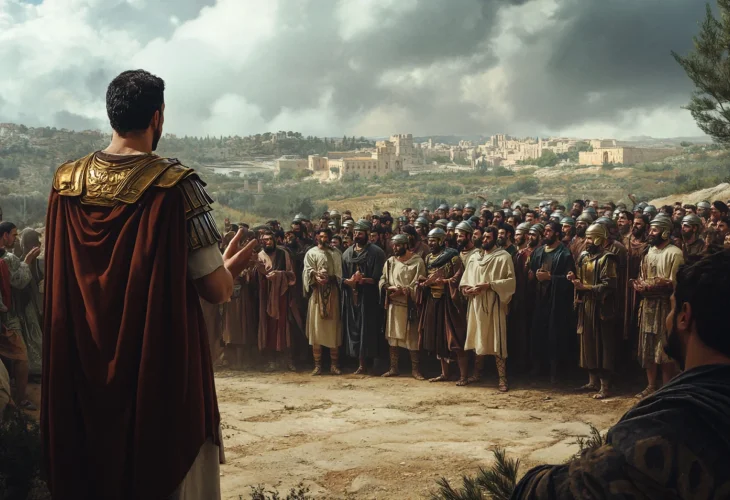History and Archaeology
The Roman Governor Who Saved the Beit HaMikdash
The true story of a Roman leader who risked execution to protect the sanctity of the Beit HaMikdash

Two thousand years ago, a Roman official named Publius Petronius made a choice that could have cost him his life. Though he was not Jewish and had no rebbe to guide him, his actions earned him a place in history as one of the chasidei umot ha’olam, the righteous among the nations.
Petronius was a respected Roman consul known for championing the rights of slaves. In the year 39 CE, about thirty years before the destruction of the Second Beit HaMikdash, he was appointed governor of Syria, a position that also gave him authority over Judea.
The trouble began in the year 40 CE, when a group of freed Roman slaves in Yavne built an altar to honor the emperor Caligula. Caligula, infamous for his arrogance and cruelty, fancied himself a god and delighted in such displays. But for the Jews of Yavne, this was intolerable. Jewish law forbids idol worship anywhere in Eretz Yisrael, and Yavne was a Jewish city.
One morning, the Romans awoke to find the altar gone, its heavy stones dismantled and removed, the ground plowed so that no trace remained. The report sent to Rome exaggerated the situation, portraying the Jews as openly rebellious.
Caligula’s response was extreme: he ordered a statue of himself to be placed inside the Kodesh HaKodashim, the Holy of Holies, in the Beit HaMikdash in Yerushalayim. This was not just an insult; it was a desecration of the holiest place in Judaism.
This decree came at a time of already strained relations between the Jews and Rome. Only a year earlier, Flaccus, the Roman governor of Egypt, had instigated brutal persecution against the Jews of Alexandria. When King Agrippa I of Judea, a grandson of Herod the Great and a friend of Caligula, visited Alexandria, he was mocked with public plays and humiliated by anti-Jewish mobs. Soon afterward, Jews were ordered to place statues of the emperor in their synagogues or face expulsion. Leaders of the Jewish community who refused were publicly whipped in the theater while the crowd laughed. A delegation led by the Jewish philosopher Philo went to plead with Caligula, but the emperor dismissed them.
With such a history, there seemed little hope that Caligula would listen regarding Yavne or Jerusalem. King Agrippa was on his way to Rome to intercede, but time was short, and defying an imperial order could mean disaster for all Judea. Caligula was known to wipe out entire populations or even the Roman Senate, on a whim.
It was then that Petronius took a courageous stand. When he marched his forces to Akko, thousands of Jews gathered there to plead with him to protect the sanctity of the Beit HaMikdash. Petronius listened carefully. He promised to consider their request, then moved on to Tiberias, followed by Jewish delegations who continued their heartfelt appeals.
Petronius understood that a direct refusal could mean rebellion and bloodshed. Instead, he devised a plan to delay. He scheduled a meeting with Jewish leaders in one week and with goldsmiths for the statue two weeks later. He ordered gold from Egypt and hammers from Edom, emphasizing to Caligula the “practical difficulties” and the danger to grain supplies and tax revenues if things moved too quickly.
Caligula saw through the delay. He sent an urgent message with one of his notorious “sheath orders”, a command for Petronius to commit suicide, sparing himself the humiliation of a public execution. At the same time, Caligula declared that the statue would be postponed until he could personally travel east to place it in the Beit HaMikdash.
But Hashem had other plans. On the very day Caligula issued the suicide order, he died unexpectedly. Petronius was spared, the statue decree was canceled, and under King Agrippa’s rule, the Jews enjoyed a short but welcome period of peace.

